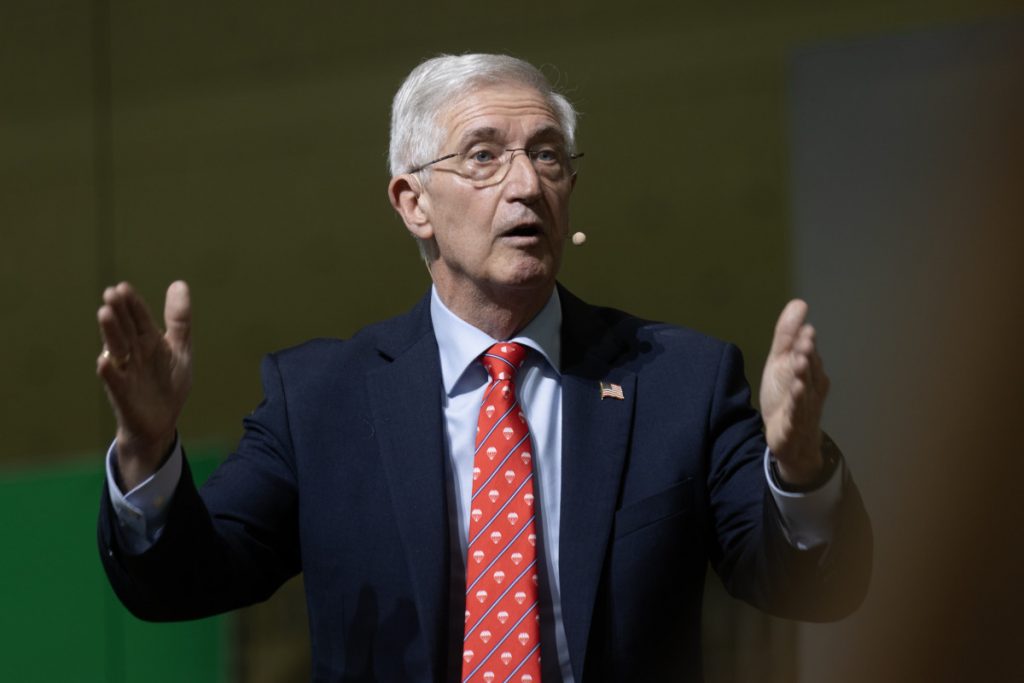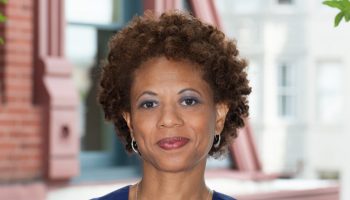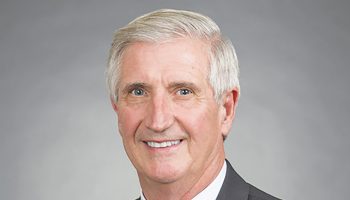
Andrew H. Card traces “The Evolution of the Modern Presidency” through his experiences serving in three different roles in three different presidential administrations Wednesday morning in the Amphitheater.
Andrew H. Card’s Wednesday morning lecture covered a career that has included working for three presidents, the power of American institutions, and the enduring importance of democracy. During his lecture, one theme rang throughout: “We are so blessed to live in America,” the first words of Card’s remarks.
Card, the second-longest serving chief of staff in White House history, was the third speaker for this week’s Chautauqua Lecture Series theme, “The Evolution of the Modern Presidency.” Before being President George W. Bush’s chief of staff for over five years, Card also served as secretary of transportation in George H.W. Bush’s administration, and as deputy assistant to the president and director of intergovernmental affairs during Ronald Reagan’s presidency.
But before working for any presidents, and before leaving the world of structural engineering to enter the world of politics, Card’s original notions of democracy were formed at his grandmother’s dinner table.
“I grew up in a family where ‘politics’ was not a dirty word,” he said, describing the ways in which his grandmother, a “militant suffragette,” encouraged her grandchildren to read the news and to begin forming their own opinions on the issues that they felt were important.
“When know-it-all Andy Card would show up at the table and shout off what he read in the newspapers, she would say, ‘That’s very interesting,’” he recounted. “‘What’s the contrary view?’”
Understanding that every person has different opinions and that no opinion is infallible, Card explained, was central to his grandmother’s beliefs about democracy, and he took that notion with him when he entered politics.
“When I got involved in politics, the rug of American politics had more rug than fringe,” he said, the rug serving as a metaphor for the center of the American political spectrum. “Today, the rug has more fringe than rug.”
One of the biggest problems Card sees in contemporary American politics, he said, is that politicians have grown less and less inclined to find common ground, instead fixating on all of their differences. But even on the fringes, he argued, there is still common ground to be found, and finding that common ground is essential to preserving the United States’ democratic institutions.
“It’s better to talk about what can be accomplished on common ground than it is by opining on the fringe,” he said.
Prior to getting involved in politics and serving in three different presidential administrations, Card worked as a structural design engineer.
“That means I’m an oxymoron because there are not too many engineers that are politicians,” he said. “And I don’t know whether I’m the ‘oxy’ or the ‘moron.’”
But he said that his background in engineering was actually a good fit for politics, since he was already used to breaking things down and examining how each part of a larger system makes everything work. More importantly, though, is that engineers always build from the bottom to the top.
So he started small, running for his local planning board and serving on the school building committee, before winning a seat in the state legislature, eventually becoming the Republican whip of the Massachusetts State House.
“There are not many Republicans to whip in the Massachusetts House,” he said to a swell of laughter from the audience in the Amp.
It was in the Massachusetts State House that he found his love for campaigns. He recounted the 1980 presidential election, when he sent a letter to all 22 Republicans vying for the party’s nomination. All 22, Card said, would have to spend some time campaigning in New Hampshire, and to get there, they would have to go through Boston’s Logan Airport. All but one of the Republican hopefuls responded to Card’s letters, in which he offered to drive them from Logan Airport to New Hampshire.
Early in the primary, he set out to research every candidate, meeting all of them at Logan and keeping a chart of all of the things he learned along the way. One name that kept popping up, and kept intriguing him, was that of George H.W. Bush.
“(Bush) joined the Navy on the day of his birthday, the day he graduated from (Phillips Academy in) Andover, and then ended up serving in more positions than any other president where he was on the receiving end of presidential orders,” Card said. “His history was remarkable.”
Card said that Bush’s vast experience in the military and in civil service, spending decades receiving orders from presidents, gave him more empathy for all the people affected by the decisions a president makes. He began working on Bush’s campaign, and when Reagan chose Bush as his running mate in the 1980 presidential election, Card felt inspired to do even more. So he ran for governor of Massachusetts.
“It was a forgettable experience for everyone,” Card quipped.
But after losing in the Republican primary, Card received a call from James A. Baker III, Reagan’s chief of staff, inviting him to come work in the Reagan White House. He accepted, becoming a special assistant to the president, making Reagan the first of three presidents Card would go on to serve and advise.
Card paused for a moment on the Amp stage, reflecting on the things his grandmother had taught him when he was growing up. One thing she said came to the forefront, a thesis for his beliefs about the American system: “The most important word in the Constitution is the very first word: ‘We.’”
The reason the Constitution is so important, the reason “we are so blessed to live in the United States,” is because the Constitution specifically inscribed that “we are the government.”
Card then spoke about his time serving in the administrations of Reagan, George H.W. Bush, and George W. Bush. He is often asked to compare the three and his experiences working for them all, but says that the task is difficult because of how much he himself changed between each presidency.
The best way he could put it, Card said, was that Reagan was like a grandfather, someone he was too intimidated to confront, even when he made a bad decision. The elder Bush was like a father, where Card may push back if he disagreed with him, but would always feel guilty and come back to apologize later. The younger Bush was like a brother, someone Card would not hesitate to berate for doing something stupid.
“So my relationship was different with each president,” Card said. “What was the same with each of those presidents was the tremendous respect they had for the institutions of government. They polished the institutions, rather than tarnish them. They met responsibility by lifting people up rather than putting them down.”
Card lamented that the state of politics had drastically deteriorated since the era of Reagan and the Bushes, and asked what tonight’s presidential debate may mean for respect in politics, and even for the presidency itself.
But most importantly, he reminded the audience – and the candidates debating tonight – that the world is watching.
“If you’re the president of the United States, you’re responsible for turning the light on,” he said. “Our light has been dimmed, and as a result autocrats feel empowered, (and) democracies are under attack. But that light on the hill needs to be turned on, and it’s got to be a beacon – a guide light for people to follow.”
Card said that, while his excitement about campaigns has dimmed in recent years, the invitation the Constitution extends to the American people to vote, to participate in democracy, remains as important as ever.
“I want us to remember that we are a ‘We,’” he said. “Answer the call, register to vote, go vote. You can make a difference.”
Card reflected again on his time in the White House, describing the evolution of “paths of truth” in the world of politics. He recounted how at the end of each work day, the White House press secretary would announce over the intercom that the “lid is on,” indicating that staffers could no longer speak to journalists, and that journalists should take their stories from that day back to their editors to be published in the next morning’s newspaper.
He described a system where editors required their reporters to find at least two quality sources for each story they planned to publish, and reporters “should be writing in nouns and verbs,” letting their sources add the adjectives and adverbs.
He said the journalism of now is not the same as it was when he worked in the White House, with some outlets more concerned about being the first to break a story than ensuring that reporting is accurate.
“Journalism has changed, which means the White House has changed,” he said.
With news outlets more and more eager to publish stories as quickly as possible, officials have less time to consider the ramifications of policy decisions, and so the “paths of truth are hard to identify,” he said.
Card spoke about the White House staff, recalling how he used to tell each new staffer that they could speak to the president any time they needed to – but never when they wanted to. He explained that one of the most valuable resources available to the president was time, and that the moment they take office “the clock starts ticking and there is no snooze button.”
He said that, while serving as George W. Bush’s chief of staff, his most important responsibility was managing access to the president, ensuring that not a single second of the president’s term went to waste.
Card closed his lecture by recounting a day that would go on to redefine the presidency for years to follow. Less than one year into his tenure as chief of staff, Card had traveled to Florida with Bush and other members of the White House staff to visit two elementary schools, promoting the No Child Left Behind Act.
Bush was preparing to read to a group of second graders on the morning of Sept. 11, 2001, when news began to spread of the terrorist attacks in New York and Washington. Card recalled preparing himself to deliver the news to the president, trying to think of what he could say that wouldn’t cause the president to panic.
“A second plane hit the second tower,” he remembered saying. “America is under attack.”
He recounted Bush’s response over the following days, weeks, and months: Bush finished reading to the second graders, he insisted on returning to Washington as soon as possible, and he addressed a shaken nation and the rest of the world, declaring to foreign leaders that “you’re either with us or against us.” Card recalled the way the country was united in a way it hadn’t been in ages, and hasn’t been since. And he reminded the audience that unity was always in reach and should always be the goal – even if it seems impossible.
“That changed America and changed the world,” he said. “9/11 taught us how to be unified. We were one nation under God.”




